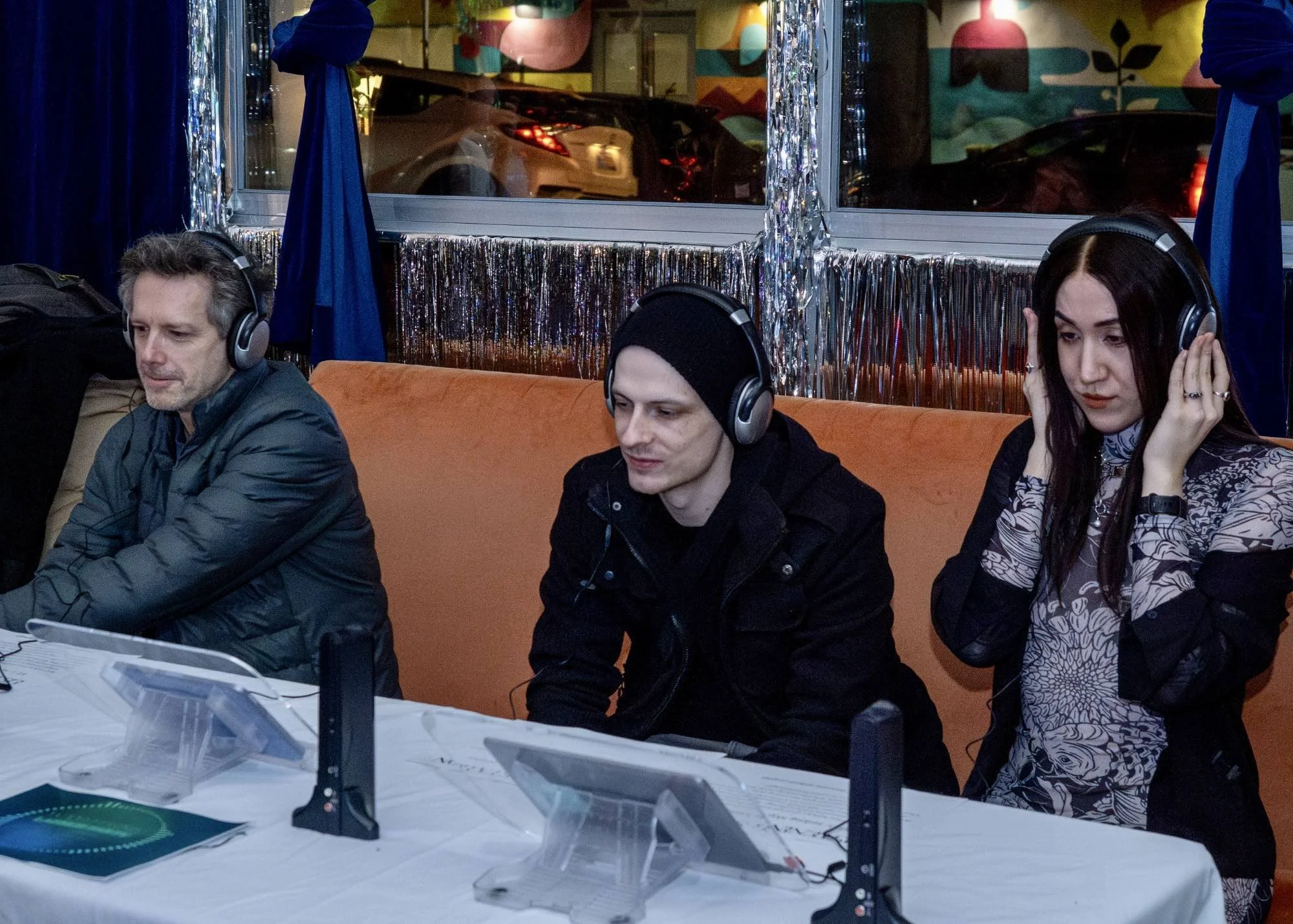At VanPodFest, Brainwashed digs into Canada's part in barbaric mind-control experiments
Journalistic investigation is just one powerful piece of this year’s audio array
In Brainwashed, Michelle Shephard (right) talks to families affected by monstrous medical experiemts at Montreal’s Allen Memorial Institute.
The Vancouver Podcast Festival runs from November 18 to 22. In Conversation: Michelle Shephard and Ian Hanomansing streams November 19 at 6 pm
JOURNALIST MICHELLE Shephard is talking to Stir about illegal human experimentation and state torture when the line abruptly cuts out. Reached a few attempts later at her Toronto office, she quips: “Yeah, we like to make jokes that when the phone goes wonky it’s the CIA.”
Kidding or not, a touch of paranoia would be excusable. After some 20 years as a journalist covering US national security matters—a world of spooks, liars, thugs, hawks, and, worst of all, bureaucrats—even Shephard admits to being shaken by what she learned in the course of making the CBC’s podcast Brainwashed.
“I do feel embarrassed that I covered national security since 9/11 without knowing this history,” she says. “Especially the Canadian connection. I’d heard about it but I didn’t know all the stories.”
Shephard is referring to MKULTRA, the CIA’s notorious and varied attempt at what’s politely termed “mind control”—a subject she’ll be discussing when she’s joined by the CBC’s Ian Hanomansing on Thursday (November 19) at this year’s Vancouver Podcast Festival.
In reality, MKULTRA was just one in a number of barbaric psycho-surgical projects officially launched by the Agency after the Korean War in 1953. The true extent of its carnage will never be publicly known since the files were destroyed—illegally—by CIA director Richard Helms, and charges were never laid against anyone involved, including program architect Sidney Gottlieb.
Gottlieb’s biographer Stephen Kinzer is among those interviewed in Brainwashed, although the six-part series hews mainly to the Canadian side of the story, specifically the monstrous work performed during the late ‘50s/early ‘60s by Dr. Ewan Cameron at the Allen Memorial Institute in Montreal. Among its roster of interviewees, Brainwashed checks in with the lawyers, survivors, and families whose tireless decades-long advocacy exposed Cameron’s abuses—and also the complicity of agencies much closer to home.
Patients reduced to infancy
“Everybody knows, obviously, about the CIA’s involvement in MKULTRA,” says Shephard, “but there’s this little told secret that the Canadian government was very much involved, and when it came to Montreal even more so in terms of funding.” Conspicuously missing from Brainwashed is any kind of official acknowledgement or statement. “We went hard on that but got zero response,” she says.
Not that a post-hoc mea culpa would lessen the impact of what we hear from somebody like Velma Orlikow. She was reduced to a state of infancy by Cameron’s depatterning and psychic driving techniques, having been admitted to the Allen, like many of his unwitting human lab rats, for what we now know as postpartum depression. It took a mere three weeks to completely wipe the mind of another survivor. Others remember having to be toilet trained after receiving their "treatment”. Shephard’s encounter with Cameron’s son Duncan is also poignant in its own way, as he fights to rehabilitate the shattered reputation of a man who once presided as the head of the Canadian, American, and World Psychiatric Associations.
Says Shephard: ”When we talked to him we really stressed that, you know, everyone is complicated and we want to present the fullest picture of your father. And he did give us some interesting anecdotes. I think that really helped round out who he was and it helped explain how his father’s ambition, when combined with funding from our government and the CIA, became so dangerous.”
As a primer on the subject, Brainwashed is a fabulous piece of work, achieving about as much as it can with the kind of archival depth and access enjoyed by career media professionals. Producer Lisa Ellenwood is a veteran of the CBC’s Fifth Estate, which has been covering the unfolding tale of MKULTRA since 1980, while Shephard’s perspective as a top-rung journalist ultimately takes the series in a rewarding, if unsettling, direction in its later episodes.
“Because of the pieces Lisa had done, so many more people had come forward,” says Shephard. “There are stories that haven’t been told before among the Canadian survivors and their families. But probably the newest part that we brought to the podcast was combining her knowledge of MKULTRA with my experiences of what happened at Guantanamo and the CIA’s black sites.”
This pedigree also hobbles the show in some ways. More than once, Brainwashed uncritically repeats the CIA’s questionable assertion that MKULTRA was scrapped in 1973 after failing to build its much desired “Manchurian Candidate” (Sirhan Sirhan’s defense team might disagree!), while a bonus episode takes a routine swipe at “the dangers of conspiracy theory.” Either one of those statements deserves more open-minded inquiry, and while Shephard concedes that the very term “conspiracy theory” is problematic—“I think that phrase has been co-opted to mean different things,” she says, “the language hasn’t evolved”—in the end Brainwashed doesn’t cross the establishment line.
Podcast diversity in the face of mainstream media
Then again: the strength of the podcast format lies in its chaotic diversity. If Brainwashed seduces the listener with authoritative mainstream polish, a show like Sandy & Nora Talk Politics—rowdy, intimate, laced with righteous profanity—wins its audience through sheer uncensored brio. In a traditional mediascape that has banished any and all left-wing or anarchist perspective, or herded consumers with the fake progressivism of the Guardian and increasingly pathetic alt-weeklies, street-level activists like Sandy Hudson and Nora Loreto bring powerful relief, daring to go where the mainstream fears to tread. The show’s popularity speaks volumes.
Recent episodes have taken a bat to a way out-of-control RCMP or the vastly underreported class and race inequities exposed in Canada by COVID-19. Joining the Vancouver Podcast Festival on Friday (November 20), Sandy and Nora go live to discuss the US presidential election, hopefully with a lot of swearing. For anyone looking to explain the surging popularity of podcasts, the answer lies in the remarkable scope between Brainwashed and Sandy & Nora. It’s a listener’s market, and the listener, it seems, wants their information at a much higher resolution than legacy media wants you to think.
“This was a frustration we had at the newspaper,” remarks Shephard, “that we became very guided by the metrics, how many times people clicked on a story, how long did they stay with the story, and I remember just being horrified. ‘Why am I doing these three thousand word pieces?’ You start to get a little cynical and think that people don’t have a long attention span. This hunger and appetite for podcasts does seem to suggest otherwise. That’s so encouraging. There’s something about the medium as a listener that works, and I can say that even for myself: now it’s the essential way I get a lot of my news, and it’s definitely the way I relax—listening to a serial podcast. The dog gets a lot of walks that way.”
















